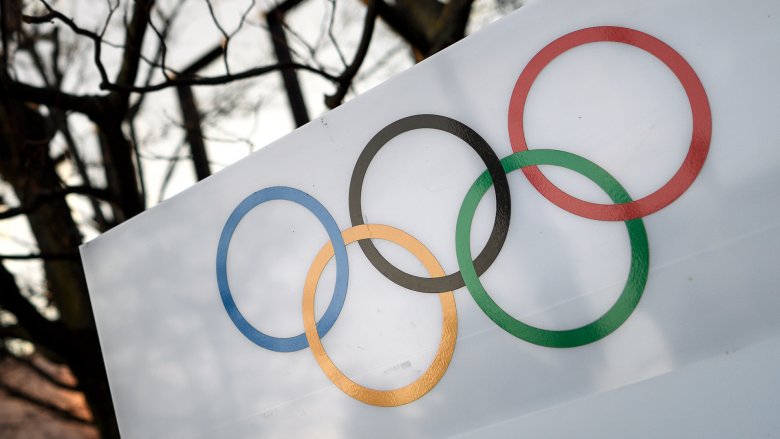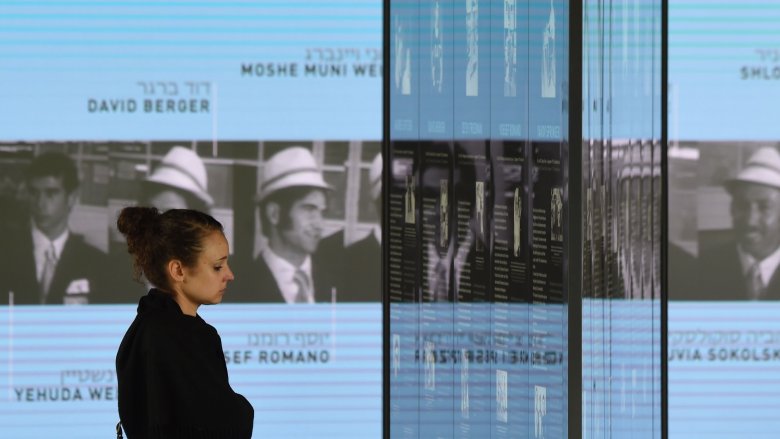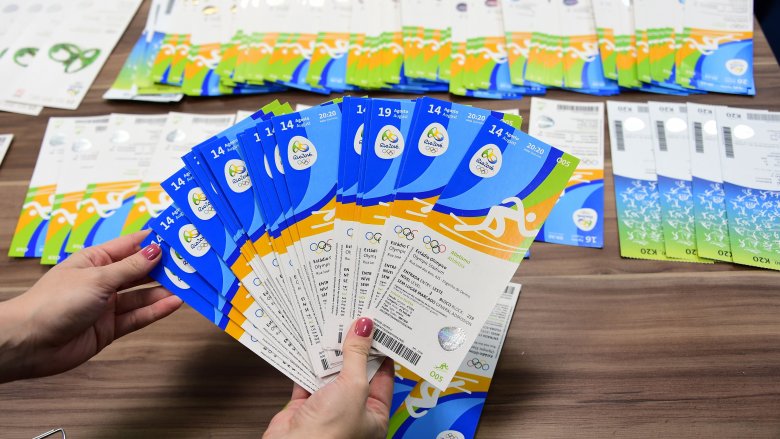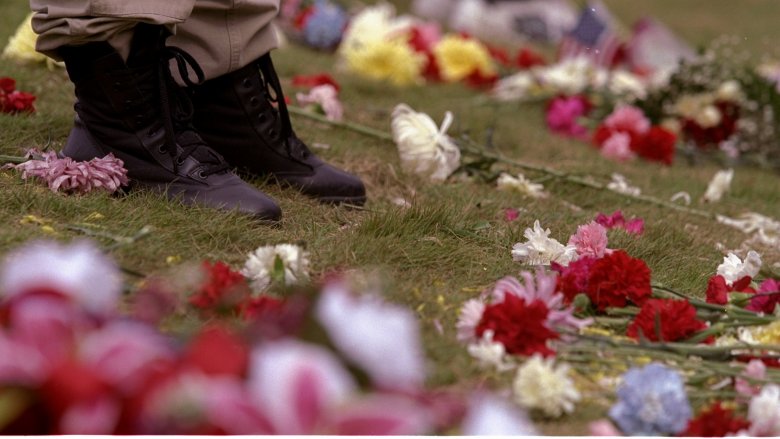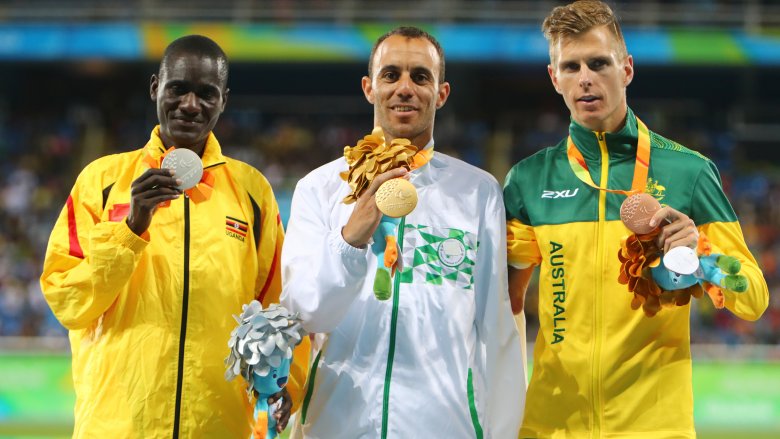Crimes That Were Committed At The Olympics
The Olympic games are a triumph of peace, harmony, and sportsmanship. All the problems individual countries might have with each other are left behind, and the only competition is between the athletes. In theory, it's a beautiful way of looking at the world, but the problem is not everyone is squeaky clean when it comes to the Olympics. Everyone from the athletes to the bureaucrats can make mistakes, and sometimes the games turn into a hotbed of bad or even tragic decisions. Still, they're a beautiful idea, and maybe the next games will be the one where everybody behaves themselves and the Olympics lives up to its ideals. Or not.
The terrorist attack at Munich
Overall the Olympics are a celebration of sport and peace. But every now and then something truly tragic mars the games, and nothing has been worse than the terrorist incident at Munich in 1972.
According to History, on September 5, a group of Palestinian terrorists did a pre-dawn raid on the Olympic village. They targeted the Israeli athletes and managed to take nine of them hostage. The group was called Black September, which would make a cool band name if it wasn't attached to something so horrible. (It also explains why they waited until halfway through the games because Black August doesn't have the same scary ring to it.)
They held nine Israelis hostage and demanded that in exchange for their lives, over 230 Palestinians be released from Israeli jails. Unfortunately, negotiations between the two sides broke down, and the ski mask-wearing Black September members took off for the airport, hostages in tow. Once they got there a fight broke out, and all the hostages were killed. Some of the terrorists managed to escape but were eventually tracked down by Mossad.
Despite the tragedy, it only disrupted a couple days of the games. A memorial service was held and the IOC president Avery Brundage called for the Olympics to continue, just to prove the terrorists hadn't won. And some of the feats recorded that year, like swimmer Mark Spitz's seven gold medals, proved that even out of terror, good can triumph.
Ryan Lochte lied about being robbed
It must be great winning an Olympic medal. And afterward you probably want to go out and get pretty drunk. That's what swimmer Ryan Lochte and some friends decided to do in Rio in 2016. The problem was they got a bit too excited and ended up on the wrong end of a police investigation.
According to USA Today, it started when Lochte gave an interview to NBC saying he and three other members of the U.S. swim team had been robbed at gunpoint on their night out. He even said a gun had been held to his forehead. Of course, the local authorities looked into this, since such a high-profile crime was going to look bad after all their Olympic safety preparations. What they found was ... nothing. Lochte had made the whole thing up.
They may have concocted the story to distract from the fact that they had been involved in some criminal damage, vandalizing a gas station restroom. The cops were not happy and called them all in. Some were ordered to pay a fine before they could leave Brazil, but Lochte saw the writing on the wall and had already gotten the heck out of the country.
The charges were eventually dismissed against Lochte, but not before he had been outed as a liar and lost some of his sponsors. He admitted he had been a little tipsy on the night in question. Hey, you try staying sober next time you win an Olympic medal.
Member of the IOC scalps 1,000 tickets
Unlike other some other sporting bodies (like FIFA), the International Olympic Committee isn't known for being very scandalous. The 15-member body does its thing bringing the games to places around the world and is mostly disgrace-free. But there'll always be one bad guy, and in this case it was Irishman Patrick Joseph Hickey who saw his career come crashing down around him just because he wanted to use his powerful position to skim a little off the top.
According to the BBC, Hickey was an Olympic judo competitor in the 1970s who rose up the ranks of various Olympic committees until he finally reached the top, joining the IOC in 2012. But during the 2016 Rio games he was involved with a scheme to sell 1,000 tickets at a steep markup, making some money from his position, which is a big no-no.
Hickey was hardly a criminal mastermind. When the Brazilian police showed up at his hotel room, his wife told them he had flown back to Ireland. Amazingly, they didn't take her at her word and after a short search found Hickey in a room booked under his son's name. NPR says he'd been so busy hiding from the police he hadn't even had time to put clothes on, since he was buck-naked when first confronted. The cops were nice enough to let him put a robe on before hauling him off for an interrogation.
A bomb in Atlanta kills two and injures hundreds
The second worst act of terror at an Olympic game after Munich was the explosion at the Atlanta games in 1996. According to the BBC, it happened at 1:25 p.m. in the Centennial Olympic Park. Up to 100,000 people a day came there to chill and listen to some music, but that day their buzz was definitely harshed. Even the dulcet tones of Jack Mack and the Heart Attack couldn't overcome the power of a 40-pound pipe bomb.
The bomb was placed near a sound tower and the carnage definitely could have been worse. CNN reported the culprit had placed it and then called the police saying they had half an hour before it went off. The area was able to be partially cleared before the bomb exploded 22 minutes later. One woman was killed by the actual explosion while a cameraman died of a heart attack while running to film the scene of the crime. Over 200 people were injured by the flying nails and screws.
Despite fears of a second bomb going off, visitors didn't let it keep them away from the events. And President Bill Clinton didn't want to let the terrorists win either, saying the games should go on.
A security guard was first suspected of planting the bomb but was cleared a few months later. It would be two years before the right person was found, and he wouldn't be convicted until 2005. He is now serving four life sentences for Atlanta and other bombings.
Nancy Kerrigan was clubbed in the knee
Perhaps no drama surrounding the Olympics has been more of a soap opera than when Nancy Kerrigan was attacked by a baton-wielding thug. Once the dust settled, everyone learned the world of ice skating was a lot more cutthroat than they ever imagined.
According to History, it all started with the ex-husband of Kerrigan's great rival, Tonya Harding. Jeff Gillooly met up with some guys who were willing to injure Kerrigan in exchange for some dough. The actual attack was carried out on January 6, just two days before the Olympic trials.
No one involved in the plot was even close to being a Mensa member, so they didn't cover their tracks very well. Soon the FBI was arresting everyone. This didn't help Kerrigan, who was injured too badly to skate. Still, she and Harding were both given spots on the Olympic team. Harding was almost kicked off as evidence poured out, but she successfully sued to keep her place.
Once the Olympics started, the drama grew. Ratings were high because everyone wanted to see the rivals skate against each other. The Washington Post reported there were 700 journalists packed into the ice rink. One estimate said Kerrigan and Harding passed within 31 inches of each other during their practice sessions. The world was obsessed with every detail. In the end Harding would only come eighth and was charged with hindering prosecution. Kerrigan was well enough to skate home with the silver.
Dance teacher cons 75 students
For a performer, there are few platforms as huge as the opening or closing ceremonies of the Olympic Games. Only the best are selected to perform, and they're watched by possibly billions of people worldwide. So how crushed must 75 British children have been when they were told they would get to dance in the 2012 London closing ceremony only to have it cruelly snatched away?
According to the BBC, it all started when a man named Stephen Moonesamy approached three dance schools and told them he needed 25 children each for the big project. The children had to go through auditions to get a spot, as well as pay £60 to participate. They ranged between 9 and 19 years old but they took it very seriously despite their youth. One kid gave up the chance to be on a vaulting team to participate, while another actually put off spinal surgery.
The weird part was Moonesamy seemed deluded enough to think it was actually going to go on somehow. He held rehearsals and even went on the radio to tell everyone about this great thing that was totally going to happen and not just a figment of his imagination.
In the end, someone thought to contact the official Olympic people and discovered it was all a big con. The kids were crushed and the judge who sentenced Moonesamy to two years in jail for fraud said he had "dashed more hopes than Simon Cowell." Ouch.
Everyone wants to grab the Olympic torch
Even before the Olympic games start, the world is greeted with a sign of their importance and unity with the torch relay. The torch travels thousands of miles once it's lit in Athens to whatever city is hosting, always burning and showing that even when we compete against each other, we are one. Or at least it would say that if people didn't keep trying to steal the darn thing.
Sometimes it's just an innocent diversion by some kids. Like in England in 2012, when Fox Sports reported a 17-year-old ran through the security cordon and tried to grab the torch before being quickly hustled away and arrested. Or that same year when two actual children decided they wanted to be part of the fun and managed to touch the torch, according to Deadspin.
Other times it's more serious. In 2008, Tibetan protesters disrupted the original lighting of the torch in Athens on its journey to Beijing. The Guardian says that they were upset that China was allowed to hold the Olympics since they have a horrible human rights record. No one in China actually got to see the protest, though, since the broadcast cut away. Sometimes people go for the torch to draw attention to something that has nothing to do with the Olympics. Another Guardian article says that happened in 2016, when a group of striking teachers managed to make the torch go out. They were protesting that they hadn't been paid for two months.
Ugandan athletes keep getting in trouble
Ugandan athletes have a bit of a history with getting in trouble at the Olympic games. In Atlanta in 1996, a Ugandan boxer was charged with circulation of illegal currency. He had managed to get his hands on some forged $100 bills and went on a bit of a spending spree with them. Did he shell out on fast cars, or diamonds, or designer clothes? Not quite. According to the Washington Post, he spent his fake cash filling his cart with $500 worth of women's underwear at Walmart. He also dropped $200 in bogus currency at a women's shoe shop.
No, he didn't have a thing for ladies' clothes. He just wanted to sell the garments at a profit when he got back home to Uganda. Instead he found himself trapped in the athlete's village long after the other entrants had gone home, though he did get released eventually.
But one of his countrymen did not learn from his mistakes. The BBC says he went further when it came to doing really bad stuff. The Olympic village is famous for its banging, with dozens of condoms being allocated to each athlete. But you still have to follow basic consent laws. In 2000, a Ugandan swimmer was arrested after forcing sex on a 17-year-old. Despite being horrible in and of itself, it was a scandal in his home country following on the drama from four years before.
The Russian doping scandal
It's not uncommon for an individual athlete to use some performance-enhancing drugs to get an edge on the competition. What was unheard of until the 2014 Sochi Olympics, however, was a wide-scale state-sponsored doping program. But that's just what the Russians got involved in, and they've been paying for it ever since.
According to CNN, some analysts and observers believe the majority of Russian athletes may have used illegal enhancers. The World Anti-Doping Agency called it "a shocking and unprecedented attack on the integrity of sport and on the Olympic Games" and you can't get much worse than that. Instead of having amateur individuals working their butts off to succeed in their sports, you have a whole country accused of doping in order to cheat its way to the top.
Eventually the mastermind of the whole operation came forward and admitted what was going on, and NPR says he is now in the witness protection program in the U.S. because Russian agents actually want to kill him for opening his mouth about what they were doing.
The people in charge were not going to stand for this cheating. Russian athletes were already banned from participating in the 2016 Rio Olympics, and recently they've been banned from the 2018 Pyeongchang games. The BBC says any athletes that can prove they are clean can participate under a neutral flag, but no one will be taking part under the Russian flag.
Brazilian Olympic Committee member used bribes to get the 2016 games
It was a big deal when Rio was awarded the 2016 Olympic summer games. For one, it was the first time a South American country had ever done the hosting. But sadly, it would emerge that the way Rio had gotten the games wasn't completely on the level.
The Guardian says just two days before Rio was awarded the games in 2009, $2 million went from the account of a wealthy Brazilian businessman to that of one of the voting body, Papa Massata Diack, who in turn voted for Brazil to get the games. It would later come out that other Brazilians were hiding assets they may have gotten from iffy connections, including actual gold bars in a bank in Switzerland. It's like shady accounting bingo.
According to Reuters, a man named Carlos Arthur Nuzman was arrested and found to have funneled another $500,000 to people in power in order to get Rio the games. He was lining the pockets of those people who were voting for where the Olympic games were held. When the scam was uncovered as part of Operation Unfair Play, which is a great name for a police raid, the whole ethics of who got to hold the games and when was thrown into disrepute.
